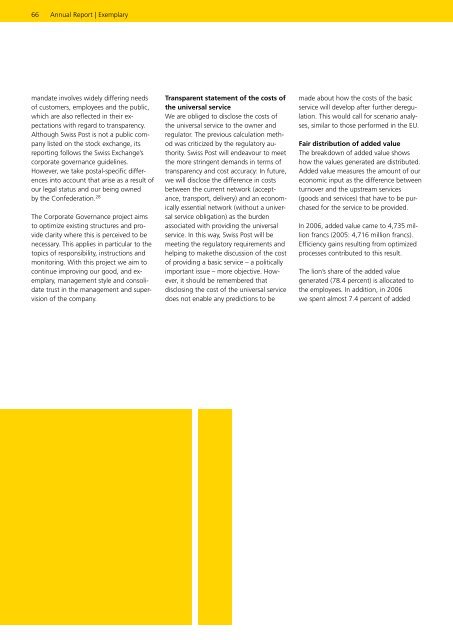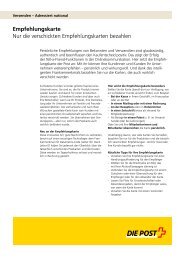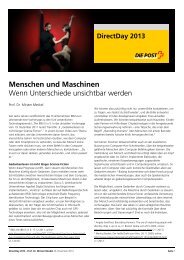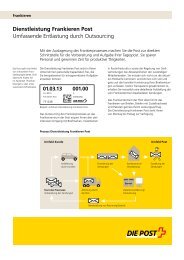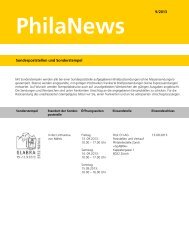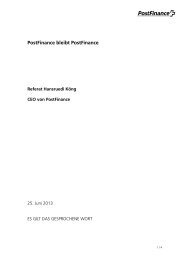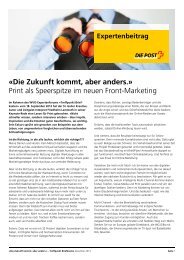Service-oriented - Die Schweizerische Post
Service-oriented - Die Schweizerische Post
Service-oriented - Die Schweizerische Post
Create successful ePaper yourself
Turn your PDF publications into a flip-book with our unique Google optimized e-Paper software.
66 Annual Geschäftsbericht Report | Exemplary 2006<br />
mandate involves widely differing needs<br />
of customers, employees and the public,<br />
which are also reflected in their expectations<br />
with regard to transparency.<br />
Although Swiss <strong>Post</strong> is not a public company<br />
listed on the stock exchange, its<br />
reporting follows the Swiss Exchange’s<br />
corporate governance guidelines.<br />
However, we take postal-specific differences<br />
into account that arise as a result of<br />
our legal status and our being owned<br />
by the Confederation. 28<br />
The Corporate Governance project aims<br />
to optimize existing structures and provide<br />
clarity where this is perceived to be<br />
necessary. This applies in particular to the<br />
topics of responsibility, instructions and<br />
monitoring. With this project we aim to<br />
continue improving our good, and exemplary,<br />
management style and consolidate<br />
trust in the management and supervision<br />
of the company.<br />
Transparent statement of the costs of<br />
the universal service<br />
We are obliged to disclose the costs of<br />
the universal service to the owner and<br />
regulator. The previous calculation method<br />
was criticized by the regulatory authority.<br />
Swiss <strong>Post</strong> will endeavour to meet<br />
the more stringent demands in terms of<br />
transparency and cost accuracy: In future,<br />
we will disclose the difference in costs<br />
between the current network (acceptance,<br />
transport, delivery) and an economically<br />
essential network (without a universal<br />
service obligation) as the burden<br />
associated with providing the universal<br />
service. In this way, Swiss <strong>Post</strong> will be<br />
meeting the regulatory requirements and<br />
helping to makethe discussion of the cost<br />
of providing a basic service – a politically<br />
important issue – more objective. However,<br />
it should be remembered that<br />
disclosing the cost of the universal service<br />
does not enable any predictions to be<br />
made about how the costs of the basic<br />
service will develop after further deregulation.<br />
This would call for scenario analyses,<br />
similar to those performed in the EU.<br />
Fair distribution of added value<br />
The breakdown of added value shows<br />
how the values generated are distributed.<br />
Added value measures the amount of our<br />
economic input as the difference between<br />
turnover and the upstream services<br />
(goods and services) that have to be purchased<br />
for the service to be provided.<br />
In 2006, added value came to 4,735 million<br />
francs (2005: 4,716 million francs).<br />
Efficiency gains resulting from optimized<br />
processes contributed to this result.<br />
The lion’s share of the added value<br />
generated (78.4 percent) is allocated to<br />
the employees. In addition, in 2006<br />
we spent almost 7.4 percent of added


